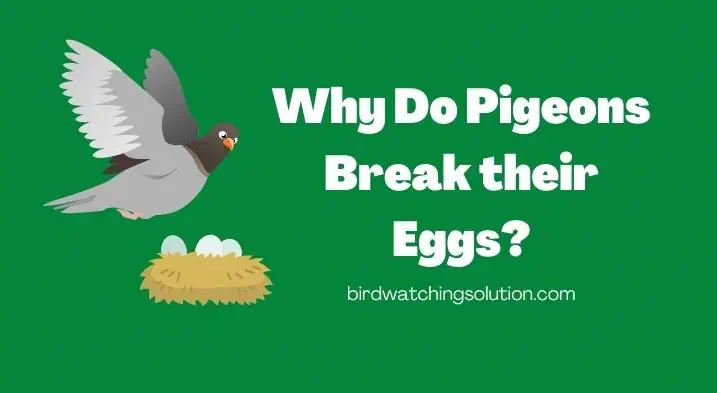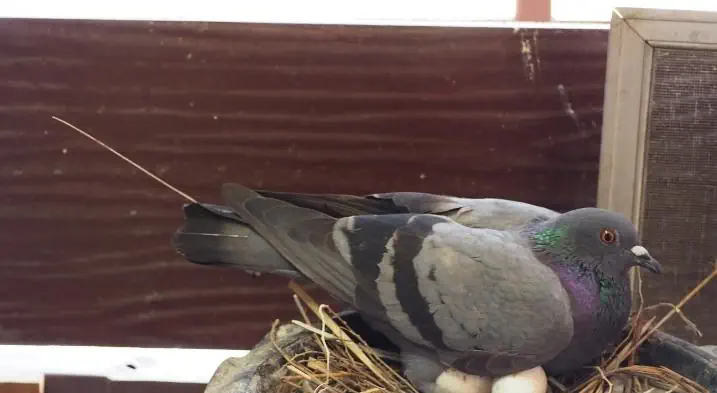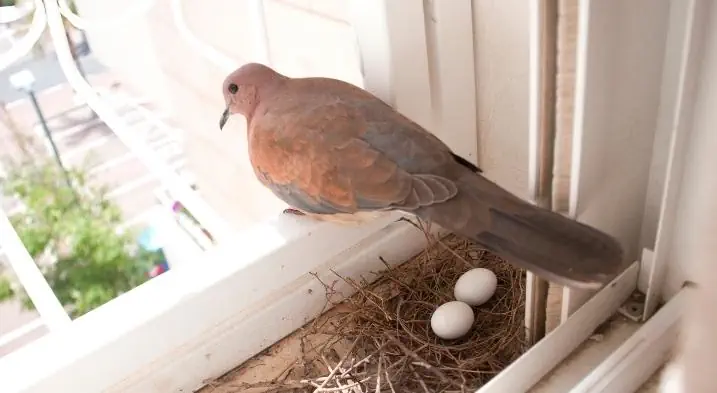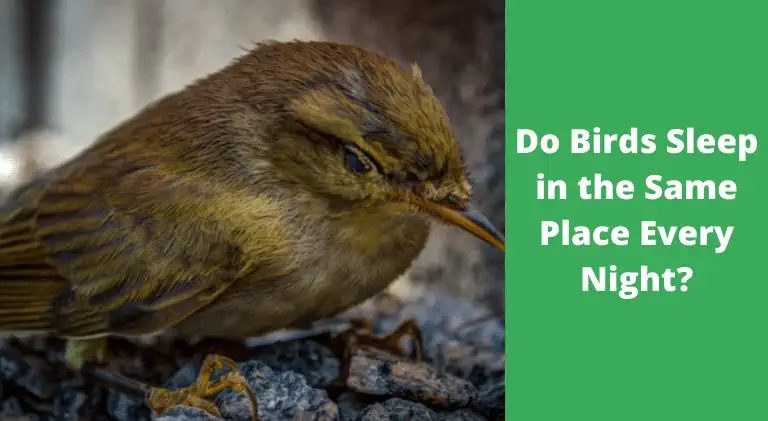Why Do Pigeons Break Their Eggs? (Shocking Facts)
Have you ever pondered the curious habits of our feathered friends? Here’s a head-scratcher for you:
Why do pigeons break their eggs?
Pigeons break their eggs whenever they find a human touching them. Besides that, they also break their eggs whenever they presume the egg to be dead, damaged, or infertile.
But fear not because we’re about to delve into the world of pigeons, nests, and eggs – all in the pursuit of unraveling this avian enigma.
Imagine this scenario: You stumble upon a pigeon’s nest, nestled in the urban hustle and bustle, and spot an egg shattered into fragments.
What could have possibly prompted these seemingly gentle creatures to crack their eggs?
And wait, there’s more to the story – these pigeons, the architects of these nests, sometimes abandon their precious eggs altogether. Do pigeons abandon their eggs?
How could this be? After all, they meticulously lay their eggs in cozy nests, so why would they suddenly walk away from them?
Hold on tight because we’re about to embark on a journey of discovery. We’ll unveil the intriguing reasons that lead pigeons to break and forsake their eggs.
From their protective instincts in the face of human touch to their uncanny ability to sense the life within their eggs, we’re about to uncover it all.
But that’s not all – we’ll venture into the world of abandoned eggs, shedding light on the factors that play a role in pigeons leaving behind their creations.
Could it be the threats of predators lurking nearby or the complexities of their reproductive health? What about the impact of the environment they call home? The more we explore, the more the pieces of this puzzle fall into place.
If you are interested in learning about all this, then be sure to keep reading till the end!

Why Pigeons Break Their Eggs?
As mentioned, pigeons break their eggs whenever a human touches them. The main reason is that they think the egg has been damaged and is no longer viable.
Pigeons also abandon their eggs if they believe they are dead, damaged, or infertile. This usually happens if the mother pigeon has been disturbed while incubating the eggs.
When this happens, the mother will fly off and leave the unhatched eggs behind. She will then build a new nest and lay more eggs.
Pigeons have been known to break their eggs, too. This usually happens when the egg is cracked or not properly incubated.
Why Do Pigeons Abandon Their Eggs?
Pigeons, like many other bird species, may abandon their eggs for various reasons, primarily linked to factors related to their environment, reproductive health, and external disturbances.
Here’s a detailed answer explaining why pigeons abandon their eggs, supported by proven facts from real-life observations and scientific studies:
Environmental Factors
Pigeons often build their nests in urban and suburban areas, which can expose them to numerous environmental challenges:
Predation Risk: Pigeons may abandon their eggs if they sense an increased threat from predators, such as cats, rats, and larger birds. The predation risk can cause pigeons to prioritize their safety over incubating eggs.
Temperature Extremes: Extreme temperature fluctuations can affect the viability of eggs. If pigeons perceive that the environment is too hot or too cold, they might abandon the eggs to prevent them from being damaged or not developing properly.
Reproductive Health
The reproductive health of pigeons plays a critical role in their ability to incubate eggs successfully:
Infertile Eggs: If pigeons lay infertile eggs (lack a viable embryo), they may eventually realize their efforts are in vain and abandon them.
Inadequate Incubation: Pigeons may abandon eggs if their incubation behaviors are insufficient to maintain the proper temperature and humidity required for successful egg development. Inexperienced pigeons might struggle with this aspect of reproduction.
External Disturbances
Various human activities and disturbances can lead to pigeons abandoning their eggs:
Human Interference: Pigeons nesting in urban areas are frequently exposed to human disturbances, such as construction, loud noises, and human presence near the nest. Pigeons might interpret these disturbances as threats and abandon their eggs to flee the area.
Nest Destruction: If a pigeon’s nest is accidentally or intentionally destroyed (for example, during building maintenance), it may abandon the eggs due to losing a suitable nesting site.
Food Scarcity
Pigeons rely on a consistent food source to sustain themselves and their young. If there is a sudden food scarcity in their immediate environment, pigeons might prioritize survival and abandon their eggs.
Disease and Parasites
Pigeons can suffer from diseases and parasites that affect their ability to reproduce and raise offspring:
Avian Diseases: If pigeons contract avian diseases, they may perceive that their current environment is unhealthy for reproduction, prompting them to abandon their eggs.
Mite Infestations: External parasites like mites can infest nests and cause discomfort to pigeons. This discomfort could lead pigeons to abandon their eggs and nest for relief.
Inadequate Resources
Pigeons require specific resources to incubate eggs successfully:
Nesting Materials: Pigeons need suitable materials to construct their nests. If these materials are scarce, pigeons might abandon their eggs because they lack a proper nesting environment.
Why Do Birds Break their Own Eggs?
Not only pigeons, but this behavior can be noticed in many other bird species. Most birds that are known to do this are precocial.
This means they can leave the nest and fend for themselves soon after hatching. Some of the common examples include ducks, chickens, and quails.
The main reason behind this behavior is that these birds have a shorter incubation period. This means there is less time for the mother to bond with her chicks.
As a result, she is more likely to reject chicks that are not up to her standards.
Another reason why these birds break their own eggs is that they are trying to conserve energy. By breaking the eggs, they can save themselves the effort of incubating them.
This is especially important in times of food shortage.
Lastly, some birds break their eggs because they are sick or infertile. In such cases, the mother bird knows the egg will not hatch. Hence, she breaks it to start fresh with a new batch of eggs.
Does pigeon eat their eggs?
You may have noticed an abandoned pigeon egg in the nest left by the female pigeons. However, the question is, do they eat their eggs?
The answer is no; pigeons do not eat their eggs. In fact, they are known to be very protective of their eggs and will do anything to keep them safe.
If you find a broken egg in a pigeon’s nest, it is most likely because the mother bird thought it was damaged or infertile.
What happens when you touch a pigeon’s egg?
As mentioned before, pigeons break their eggs whenever a human touches them. This is because they think the egg has been damaged and is no longer viable.
However, there is no need to worry if you accidentally touch a pigeon’s egg. The chances of the egg being broken are very slim. You may have seen pigeons lay eggs in the pigeon coops. However, these are usually pet pigeons and are not wild ones.
Apart from that, wild pigeon eggs have much lesser survival chances because they are not as protected as pet pigeons are. Most of them are usually destroyed by natural disasters and even predators.

How do you know if a pigeon egg is fertile?
To know whether a pigeon egg is fertile, you must wait around 18 days. This is the time it takes for a pigeon egg to hatch.
You must ensure the egg is kept at around 82 degrees Fahrenheit during this time.
You can use an incubator or keep the egg in a warm room. Once the 18 days are over, you can see a small chick inside the egg.
If there is no chick, then it means that the egg is not fertile.
Can you put a bird egg back in its nest?
Ok, you found a bird egg on the ground and are unsure what to do with it. Should you put it back in the nest?
The answer is yes; you can return the egg to the nest. Now you might be thinking, how? Because we just learned that parent pigeon abandons their eggs whenever they smell human scent on them.
Why do birds break their eggs if you touch them then? It is because when you touch a bird’s eggs, you leave your smell on them. Birds consider this a threat, and they no longer feel their nest is safe.
I have written a detailed guide on this topic, so you might want to read that if you are interested in learning about this behavior.
How many eggs do pigeons lay at a time?
Pigeons usually lay two eggs at a time. However, sometimes they may even lay 3 or 4 eggs.
The number of eggs a pigeon lays depends on several factors, such as the bird’s age, weather, and food availability.
Generally, younger pigeons tend to lay more eggs than older ones. Besides that, some other factors can affect the number of eggs a pigeon lays.
For instance, the pigeon may not lay eggs if the weather is too hot or cold. Similarly, if there is a shortage of food, then the bird may only lay one egg.
Can I move pigeon eggs?
The next question you might have is, can I touch pigeon eggs? How about moving them from one place to another or perhaps a safer place?
No, you should not move pigeon eggs from one place to another. This is because when you do so, you disturb the egg’s delicate balance.
The best thing to do is to leave the egg where it is and let nature take its course. If you move the eggs somewhere, even a few feet away, the parents will abandon the whole nest and never return to it.

Why Does the Mother Pigeon Not Sit on Her Eggs?
Sometimes, the mother pigeon does not sit on her eggs. So, do pigeons throw eggs out of the nest? Let’s take a closer look at this situation from various angles.
The first thing that a mother pigeon does not sit on her eggs is the temperature inside the nest is too hot for the eggs.
If the eggs get too hot, they will start to develop defects. To prevent this from happening, the mother pigeon will leave the nest for short periods so that the eggs can cool down.
If the temperature is too high, then there is a higher chance of the eggs getting rot.
The second reason the mother pigeon does not sit on her eggs is that the male pigeon is not around.
The male pigeon usually takes over sitting on the eggs when the female has to leave for some time. However, if the male is not around, the female must do it alone.
The third reason is that the female pigeon is not feeling well. If the female is not well, she cannot care for the eggs properly. In such a case, it is best for her to leave the eggs and rest.
The fourth reason the mother pigeon does not sit on her egg is that she is not getting enough food.
If the female pigeon is not getting enough food, she will not have enough energy to sit on the eggs all day. In such a case, it is best for her to leave the eggs and search for food.
What to Do with Unhatched Pigeon Eggs?
If you come across unhatched pigeon eggs, there are a few things you can consider doing, depending on the circumstances and your intentions. Here are some options:
Observe and Wait:
Sometimes, eggs might take longer to hatch than expected due to variations in incubation conditions or other factors.
If the eggs appear intact and undamaged, you might want to give them more time to see if they hatch naturally.
Ensure to maintain a safe distance and avoid disturbing the nest as much as possible.
Consult Experts
If you’re unsure about the status of the eggs or how to proceed, it’s a good idea to consult with local wildlife experts, ornithologists, or avian rehabilitation centers.
They can provide guidance based on their expertise and knowledge of local bird species.
Create a Safe Environment:
If you suspect that adult pigeons have abandoned the eggs, you might want to consider creating a safe and warm environment for the eggs.
You can place them in a small container lined with soft bedding material and keep them in a warm, quiet, and secure location.
However, remember that raising baby pigeons (squabs) requires specialized care, and it’s best to consult experts if you’re planning to undertake this responsibility.
Practice Caution:
If you decide to handle the eggs, it’s crucial to handle them gently and avoid rotating or shaking them. Eggs have delicate structures, and mishandling can damage the embryos inside.
Disposal:
If the eggs appear damaged, cracked, or have been left exposed for an extended period, likely they are no longer viable. In such cases, you can dispose of the eggs carefully by burying them or placing them in a compost bin.
Educational Opportunities:
If you’re an educator or someone interested in science education, unhatched pigeon eggs can provide valuable learning opportunities for students.
They can be used to teach about bird reproduction, embryonic development, and the importance of wildlife conservation.
Can a bird’s egg survive if cracked?
A pigeon egg broken cannot survive. This is because the inner membrane gets damaged when an egg is cracked. This damage exposes the embryo to bacteria and other harmful microorganisms in the environment.
These microorganisms can cause infections in the embryo, leading to its death. In addition, a cracked egg also loses a lot of moisture.
This loss of moisture can cause the embryo to dehydrate and die. Thus, it is best not to try and incubate a cracked egg.
Why Do Bird Eggs Hatch at Different Times?
The reason behind this is that bird eggs are incubated at different temperatures. The temperature inside the nest determines the incubation period of the eggs.
If the temperature is too high, the eggs will hatch early. On the other hand, if the temperature is too low, the eggs will hatch late.
The ideal incubation temperature for most bird species is between 99 and 102 degrees Fahrenheit.
Final Words
So Why Do Pigeons Break Their Eggs? well as you can see, there can be many reasons behind it. Most of the time, the bird will break its eggs if she suspects the egg to be damaged or infertile.
However, she also breaks them whenever she feels a threat to her nest or if the weather conditions are unsuitable for the eggs.
I hope you found this article helpful. If you have any questions or comments, please leave them below.
References
- Laboratory observations on the reproductive behaviour of the pigeon (Columba livia) during the pre-incubation phase of the breeding cycle
- The significance of some behaviour patterns of pigeons
- Significance of the Pattern of Nest Distribution in the Pigeon Guillemot (Cepphus columba)
- Patterns of breeding behaviour in the domestic pigeon






![How Much Does a Trained Hawk Cost? – [Facts Explained]](https://birdwatchingsolution.com/wp-content/uploads/2021/12/How-Much-Does-a-Trained-Hawk-Cost.webp)
